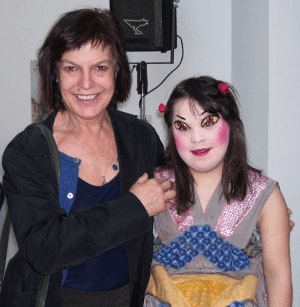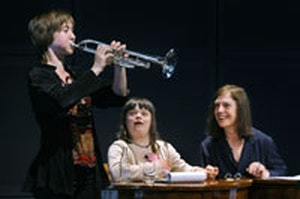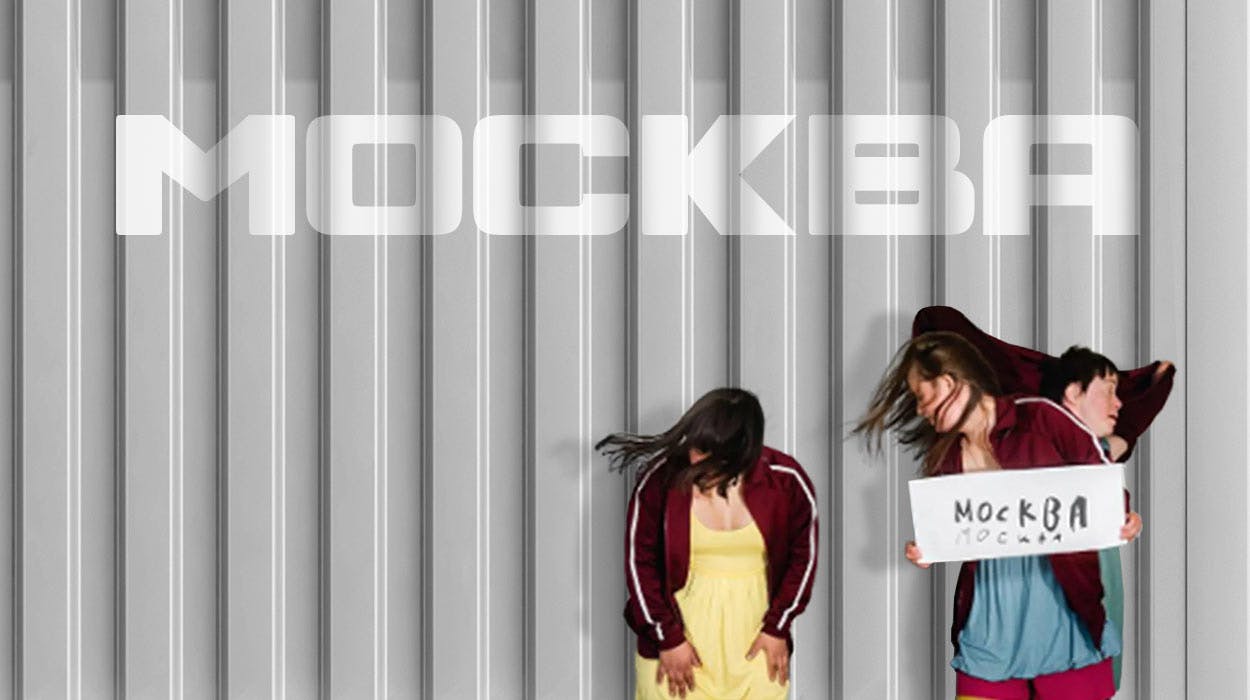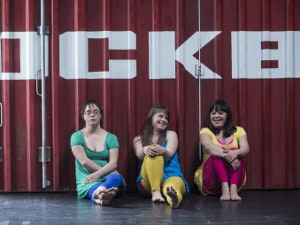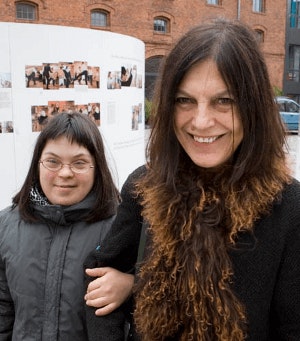Angela Winkler and her daughter Nele on love, the eye of the needle and the sun
We talk with Angela Winkler and her daughter Nele in the courtyard of the theatre at the Schiffbauerdamm, where tables and chairs of the theatre canteen stand under shady trees. The sun shines. We talk about “Schwestern” (Sisters), a theatre project with the handicapped actresses Nele Winkler, Juliana Götze and Rita Seredsuß from the RambaZamba Theatre in Berlin. Supporting roles: Nele's brother Tammo Winkler and her mother Angela Winkler.
“Schwestern” (Sisters) has been performed in Berlin, Luxembourg and Lichtenstein. In the evening, Angela Winkler performs at the Schiffbauerdammtheater as Jenny in “The Threepenny Opera” by Brecht. Nele Winkler says she knows the play by Brecht well. Her mother wants to know if she will be there tonight. Nele is not sure because she has seen it so often with her mother. She says this and laughs. Daughter and mother are united by their love for the stage.
In the interview we talk about Nele Winkler as an actress, about Angela Winkler's role in the play and in her daughter's life. It is about the self-discovery of young women, about them becoming independent from the parental home, both main themes of “Schwestern” (Sisters). It is about disability on stage and in life. We also talk about Chekhov's play “Three Sisters”. Featuring siblings Masha, Irina and Olga and their brother Andrei, they long to trade the stifling Russian provinces for an exciting life in the capital, Moscow.
Unlike in Chekhov, Nele, Juliana and Rita no longer long for change. It has already occurred. The three women leave a sheltered parental home and face independent living in a “shared flat” – a current, autobiographical situation for Nele and Angela Winkler, with which the audience is confronted.
During the conversation, Nele finds it easier to answer questions by referring to her own experience or by acting out what she means. Her cheerful manner sets the pace and mood of the conversation, which quickly takes on the character of an exchange between friends.
May I ask you a personal question first? What is the story behind the name “Nele”? What does it mean?
Nele: You can call me Miss.
Angela: Originally, I didn't want to call her Nele, but Liuba or Lou. My father was a physician. He told me about Liuba, a Russian doctor, whom he met at the Russian front. She must have been wonderful. Liuba means “love” or “lover” in Russian. I thought: If I have a little daughter, I'll call her Liuba. Then Nele came along and she was very small. Nele means “eye of a needle” in Dutch. As a mother, you hold the newborn in your arms and various names come to mind. Eventually, a name remains. And that was Nele.
We want to talk about her role in the play “Schwestern” (Sisters). What is it about?
Nele: That is a good question. I am a member of the RambaZamba Theatre. We have already performed many plays there. We are currently rehearsing “Philoktet”. I play with Jakob there.
The three sisters from the play are played by three actresses who were born with Down syndrome. Will the audience learn anything about Down syndrome in the play?
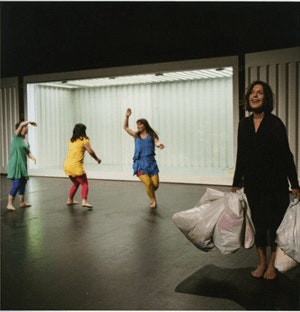
Nele: There are people with Down syndrome who wear glasses. Not always. Sometimes. There are also some who are not good at maths. I cannot do it right yet. But I'm good at other things, like reading a book or listening to music. We also dance in “Schwestern” (Sisters). We did that with Davide Camplani. We also had to learn texts by heart, together with Angela.
Which of you is better at learning by heart?
Nele: Me and Juliana. I am the best. When Angela comes, I start dancing. (Makes different movements with her arms) Rita does this, Juliane does this. I go like this. I am Masha, the sun. For that, I make movements like this.
Angela: For Nele, Down syndrome is not an issue. She doesn't care at all. It does not concern her. You can talk about abstract concepts better with Juliana. Nele is different in that respect. Nele grew up without these questions.
Nele: Reach out and be a picture.
Angela: Yes, reach out and be a picture – that is Nele.
Nele: Being a force.
Angela: In my opinion, everyone is better at different things. Go ahead and read the dream you read in the play.
Nele: (reads from her notebook): “Once upon a time in France. Then came Lasse and cooked Wischmedi. Margarita Breu is sitting by the lake, on the lawn with a pot. Here comes Ameli with Wischmedi in her hand. Tammo says to Amelie: Not you. Amelie always wants Margarita and Margarita runs after Amelie. Amelie has a red fork in her hand. She ties the fork to the bed. Amelie runs up another three metres and continues to the end. And I keep on dreaming. I hardly notice anything more. My ears are damaged. I toss the glasses and I toss the wiwili too. I fell and hurt my knee. Gregor says to Amelie: What happened to you? She says: My knee hurts. Gregor gives Amelie a bar. And Amelie walks with crutches to her parents. I stay back with Gregor.
Angela: I write down what Nele says. For example, she comes from the dentist to the rehearsal and says: “I had a fulfilment.” I gave the director a notebook with Nele's texts. He blends them with text by Chekhov. Hence, “My room has longing.” That is Nele's quality, if I may say so as a mother.
The director knows the three actresses from the play “Lilith's Return” (also performed at “Wege durch das Land”). Rita moves very differently than Juliana. Nele is extremely hard-working and learns texts by heart. She also plays the trumpet well. She loves playing the trumpet.
I watched a wonderful performance by Christoph Marthaler (theatre producer, composer, director) in Vienna: “Schutz vor der Zukunft” (Protection from the Future), which is about the euthanasia programme in the Third Reich. It is about the events in the Viennese sanatorium and nursing home “Am Steinhof”, where also children died. The actors play brass instruments in the play, from the smallest trumpet to the bass tuba. This made me think of the trumpet for Nele.
She now has regular trumpet lessons. Her teacher played in “Schutz vor der Zukunft” (Protection from the Future). The three of us also performed together when Nele and I read from Andersen's fairy tales (Wege durch das Land, 2 June 2012). Playing the trumpet is important for Nele. It strengthens the lungs. After all, she gets bronchitis easily. It helped her a lot to better manage the disease.
Acting as therapy?
Angela: Yes, that is true for all actors. They have their happiness. That makes everyone happy.
Do you have a favourite role?
Nele: Yes,….
Angela: You learned the role of Polly (from The Threepenny Opera) completely by heart.
Nele: Yes, back then.
Angela: We even got offers. Gisela Hoehne from the RambaZamba Theatre but also Klaus Pohl wanted to do this with her. She was also once considered for “Romeo and Juliet”.
She could become a Tatort (German crime series) detective one day, right?
Angela: She could play my assistant. She has such a spontaneous sense and is always right. The two of us, I would love that. Or the other way round, you are the chief and I am your assistant. You are the one who is always on the right track.
So who else could possibly move into the “shared flat” you are living in now?
Nele: I would like Juliana to move in. That is what I wish for.
Could I also move into the shared flat?
Nele: Could be.
Angela: I would like to be more in our house in Brittany. Nele in a shared flat, then she will no longer be at home. That suits her fine, I thought. This would require some organisation, of course. Living on her own is difficult for Nele. She is autonomous, but someone has to be there for her. She also has a pacemaker.
Nele grew up very differently than most. With us, everything is free......... Nele participated in everything. I always brought her with me like all the other children.
So with “Lebenshilfe” I organised a shared flat for theatre staff. The idea was that actors from RambaZamba Theatre would also live together. Zora and Sascha lived in the shared flat. “RambaZamba” is a big group after all. Sebastian has moved out. Another person who does not have Down syndrome has moved in. Christian is not an actor. He paints. Nele paints wonderfully. The shared flat currently consists of six people, four of whom are actors from the RambaZamba Theatre.
Nele: We are three men and three women, Zora, me and Steffi. Hagen does the gardening.
Angela: We also considered having someone move in who is able to take care of themselves, a student, for example.
Which significance does Down syndrome have in theatre performance, on stage?
Angela: The differences between people can be shown particularly well with actors who have Down syndrome. The Hora Theatre in Zurich operates like the RambaZamba Theatre in Berlin. That's nice in today's world, where you're forced into a norm. Everyone has to parry, has to be able to do everything. That's why everything is so stressful these days. In the theatre for disabled people you can let loose for a while. One cannot lift a leg. Instead, he can raise his arm. It is eye-opening.
This form of theatre is free. That makes Nele's trumpet music so beautiful. Freely. This does not involve playing through the hands, as it does with the piano. Nele did that before. She then had to decide, piano or trumpet. She was right to choose the trumpet. That is clear to see. That's a joy to see. That is the reason why I enjoy watching the theatre of disabled people so much.
Jerome Bell has had great success in his work and performances with disabled actors. (Jerome Bell “Disabled Theatre” & Hora Theatre). He shows what power these people have! This is also true for “Schwestern” (Sisters) and Gisela Höhne's theatre. (director of the RambaZamba Theatre).
I believe........... if you look for beauty in life, you will find it. I was looking for Nele's beauty……….
Why do I have to look for it especially closely? Do I need to watch the professional theatre play of disabled people for that? Where does it lead me?
Angela: Hearing someone with a disability like Mr. Quasthoff sing, for example, makes me forget about the disability. Then I only listen to the voice. If someone has poetry in them, it is greater than any disability. I am completely engaged in the specificity of his play and forget what might otherwise bother me.
The view with which you look at things is always crucial. The theatre is capable of showing that. I also got a lot out of my profession as an actress. That is also why I enjoy watching it so much.
Interview summary Stefan Heiner, 1 May 2015
